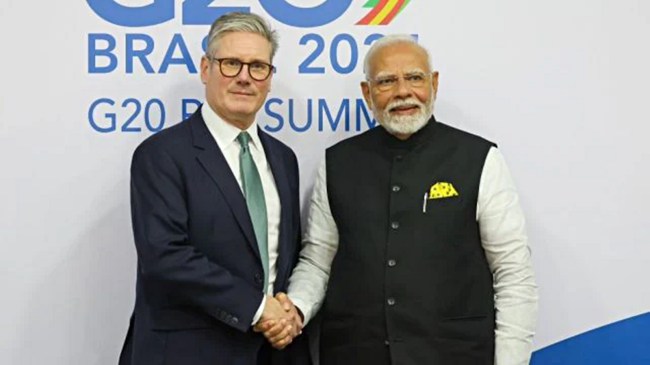Opinion PM Modi’s UK visit: Could the India-UK FTA be a game changer amidst global trade shifts?
Under the India-UK FTA, India is set to benefit from the elimination of tariffs on about 99 per cent of exports. This is expected to boost key sectors such as textiles, leather, footwear, sports goods and toys, marine products, gems and jewellery, engineering goods, auto parts and engines, and organic chemicals
 The India-UK FTA would eliminate duties on 99 per cent of Indian exports to England.
The India-UK FTA would eliminate duties on 99 per cent of Indian exports to England. Prime Minister Narendra Modi is visiting the United Kingdom (UK) this week. A key part of the trip is expected to be the signing of a bilateral Free Trade Agreement (FTA). At the conclusion of negotiations in May, Modi described the agreement as a “landmark deal,” while UK PM Keir Starmer hailed it as Britain’s “biggest trade deal” since Brexit. These talks are taking place at a time when the Donald Trump administration in the United States is attempting to reshape global trade rules through a barrage of tariffs.
India and the UK have long-standing historical ties. To consolidate these links, both signed a Strategic Partnership in 2004, which was elevated to an Enhanced Partnership for the Future in 2010. This has been supported through a strong institutional mechanism, including summit meetings, Foreign Office Consultations and various dialogues.
Since Brexit, New Delhi and London have been trying to strengthen these ties further. A virtual summit between Narendra Modi and Boris Johnson in 2021 upgraded relations to a Comprehensive Strategic Partnership. Both countries also adopted an ambitious Roadmap 2030 which highlighted growing convergence in trade and investment, defence and security, climate action, health, counter-terrorism, as well as people-to-people contacts and mobility. In 2023, India and the UK established the 2+2 Foreign and Defence Dialogue, and in 2024, they launched the Technology Security Initiative.
The British tilt towards the Indo Pacific since July 2021 and fast-track FTA negotiations from January 2022 provided new impetus to ties. Despite constant shifts in British political dynamics (six PMs since 2016) and sporadic activities of radical Sikhs in the UK, New Delhi’s ties with London continue to witness an upward trajectory. Indian companies, too, have adjusted well to post-Brexit disruptions.
Since Brexit, the UK has signed deals with Australia and New Zealand, and has joined the Comprehensive and Progressive Agreement for Trans-Pacific Partnership (CPTPP). The UK was also the first country to sign a trade agreement with the United States following the “reciprocal tariffs” announced by the Trump administration. Similarly, India has signed agreements with Mauritius, Australia, the UAE, and the EFTA (European Free Trade Association) countries. Negotiations with the European Union and the United States are also at advanced stages.
Under the India-UK FTA, India is set to benefit from the elimination of tariffs on about 99 per cent of exports. This is expected to boost key sectors such as textiles, leather, footwear, sports goods and toys, marine products, gems and jewellery, engineering goods, auto parts and engines, and organic chemicals.
India, in turn, will reduce or eliminate tariffs on 90 per cent of its tariff lines, with 64 per cent seeing immediate liberalisation. The British food and drinks sector will be among the immediate beneficiaries. Nearly 90 per cent of UK exports in this category are Scotch whisky, which currently faces a 150 per cent tariff. Under the agreement, tariffs on whisky and gin will initially drop to 75 per cent, and further to 40 per cent in over ten years.
Automotive tariffs will be cut from over 100 per cent to 10 per cent under a tariff rate quota system. This could pose a significant challenge to the Indian automobile sector and run counter to the Make in India initiative. Furthermore, it may prompt the EU, the US, and others to seek similar concessions.
The agreement also includes commitments on services, covering IT/ITeS, financial and professional services (including architecture and engineering), as well as educational services. It will ease mobility for Indian professionals and provide a three-year exemption from social security contributions in the UK for temporary Indian workers and their employers. Social security contributions will be paid in India, rather than in both places. Since this is only a temporary arrangement, a long-term agreement still needs to be negotiated. The exemption granted by the British government is already facing objections from both the Conservatives and the Liberal Democrats. The British government, however, is confident as the UK has similar agreements with a large number of countries including the EU, the US and South Korea.
The FTA is also expected to include a chapter on trade and development cooperation. Both countries have agreed to monitor the agreement’s impact on other developing nations. Given that over half of the UK’s global trade is digital, the agreement will include provisions on cross-border data flows and data localisation. Additionally, both sides have made commitments related to public procurement. India’s willingness to engage in new areas marks a policy shift but may lead to unforeseen challenges. It may also lead the EU, US, and others to demand similar terms.
According to Indian government sources, the India-UK goods trade exceeded $23 billion in 2024-25, with India exporting goods worth around $15 billion. British government data, meanwhile, shows that bilateral trade in goods and services reached nearly £43 billion (approximately $58 billion) in 2024. Of this, Indian exports to the UK accounted for approximately $35 billion. Both governments hope that the new deal will help double this figure over the next five years.
The UK was also the first country to sign a Bilateral Investment Treaty (BIT) with India in 1994. Between 2013 and 2019, India terminated 77 BITs including with the UK. This happened because India faced many international arbitration claims under the BITs. The new investment treaty is still being negotiated.
Both India and the UK are also focussing on triangular development cooperation projects in Africa and the Indo-Pacific. Still, convergence on many foreign policy issues will not happen automatically. On the Ukraine war, Indian and British perceptions differ. Despite declared ambitions, progress has also been limited in the defence and security sector. Despite strategic convergence on issues like the Indo-Pacific and joint military exercises, cooperation must align with India’s goal of developing its domestic defence industry through joint production and technology transfer. But it is hoped that the momentum generated by the FTA could also pave the way for progress in other sectors during Prime Minister Modi’s visit to London.
The writer is Chief Coordinator DAKSHIN- Global South Centre of Excellence at the RIS New Delhi and Professor of European Studies at Jawaharlal Nehru University




